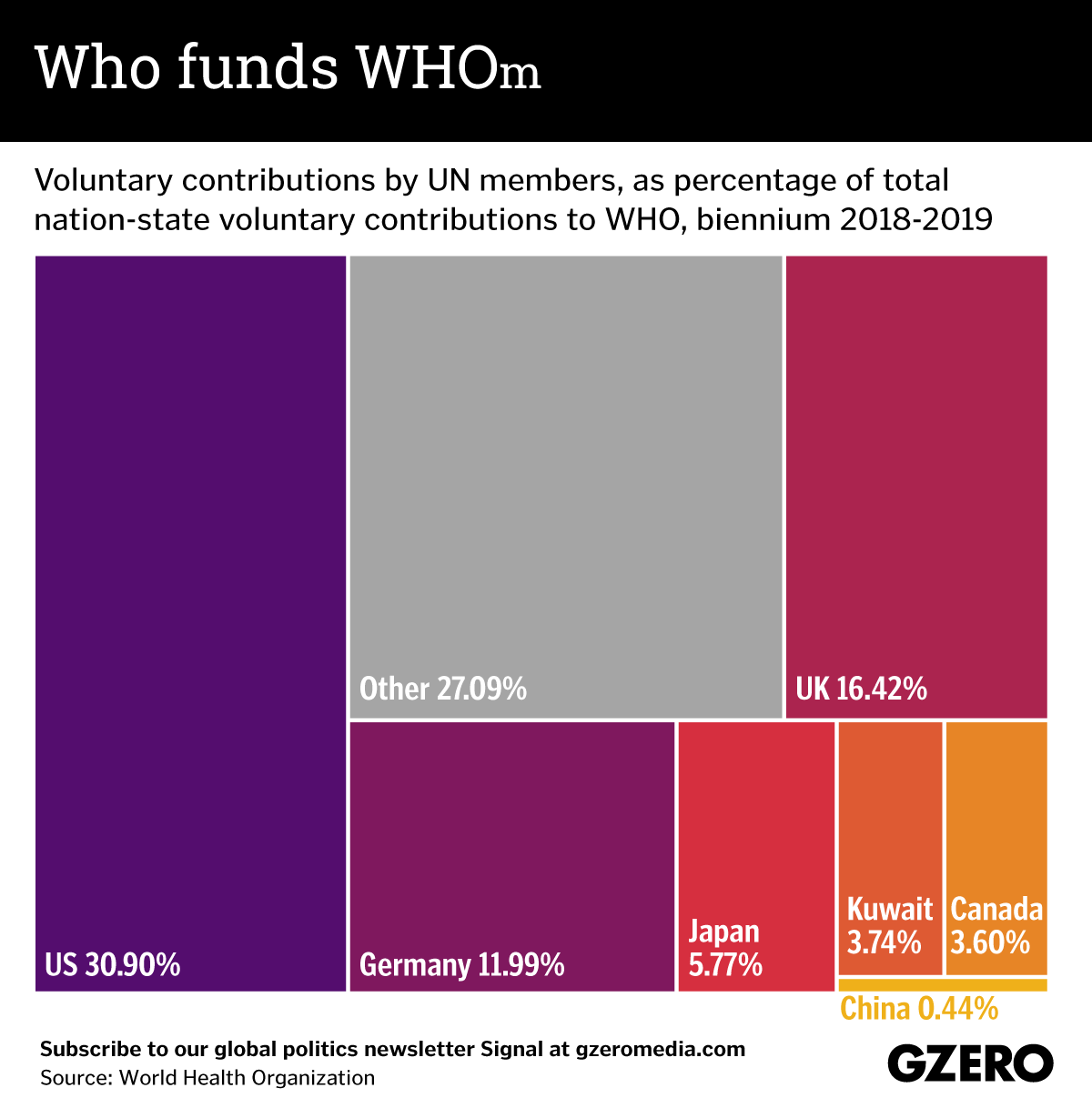President Trump has suspended American funding for the UN-affiliated World Health Organization (WHO), because of concerns that the organization has failed to force an honest appraisal of China's response to COVID-19. In the days since, a lot of attention has been paid to the fact that China pays the second largest dues to the WHO after the US. But the majority of the organization's funding actually comes from voluntary contributions from nation states and other entities, including philanthropic organizations and NGO's. Here's a look at which member states account for the largest portion of the voluntary contributions that come from national governments.
☰
More from GZERO Media
- YouTube
What would Ukraine be willing to offer Russia to bring an end to the war? It’s a question that’s been asked over and over, but now seems closer to reality than any point since the fighting began. As the White House negotiates with the Kremlin for a ceasefire deal, would Kyiv be willing to cede territory to get Moscow to the negotiating table? On GZERO World, Ian Bremmer sat down with former Ukrainian foreign minister Dmytro Kulebo for a sober assessment of the war—and what it will take to end it.
An aerial photo shows the Kumamoto factory of Taiwan Semiconductor Manufacturing Co., Ltd. (TSMC), the largest semiconductor contract manufacturer, in Kikuyo Town, Kumamoto Prefecture, Japan, on March 14, 2025.
The Yomiuri Shimbun
The topsy-turvy-tariff tale continued to swing, as the Trump administration advanced a plan on Monday that could result in new levies on semiconductors and pharmaceuticals. The news came days after US President Donald Trump announced that smartphones would be exempt from the 145% duty that he had slapped on China.
Double exposure photograph of a portrait of Mark Zuckerberg and the Meta Group logo at Kerlouan in Brittany in France on April 11 2025.
Hans Lucas via Reuters
The case, which alleges that the purchase of Instagram violated anti-monopoly laws, is seen as a bellwether for Big Tech's relationship with Trump 2.0.
With US-China trade war raging, Xi Jinping launches a charm offensive in Southeast Asia
April 14, 2025
Chinese President Xi Jinping meets Vietnam's National Assembly Chairman Tran Thanh Man during his two-day state visit, in Hanoi, Vietnam, April 14, 2025.
REUTERS/Athit Perawongmetha/Pool
The Chinese president began a three-country tour of Southeast Asia, a region caught between the US and China as the two global giants square off in a trade war.
El Salvador's Bukele refuses to return wrongly-deported Maryland man, and offers to jail US citizens too
April 14, 2025
U.S. President Donald Trump meets with El Salvador President Nayib Bukele in the Oval Office at the White House in Washington, D.C., U.S., April 14, 2025.
REUTERS/Kevin Lamarque
El Salvador's president said it was "preposterous" to ask him to return Kilmar Abrego García, a man wrongfully deported to El Salvador because of an "administrative error."
Ukraine's President Volodymyr Zelenskiy, France's President Emmanuel Macron and Britain's Prime Minister Keir Starmer speak during a trilateral meeting on the sidelines of a summit for "Coalition of the Willing" at Elysee Palace in Paris, France March 27, 2025.
Ludovic Marin/Pool via REUTERS
With Russia’s Vladimir Putin pressing forward on one side and America’s Donald Trump potentially stepping back on the other, curious new things are happening in the European defense sector.
Demonstrators rally on Cambridge Common in a protest organized by the City of Cambridge calling on Harvard leadership to resist interference at the university by the federal government in Cambridge, Massachusetts, U.S. April 12, 2025.
REUTERS/Nicholas Pfosi
- YouTube
The United States has become the principal driver of geopolitical uncertainty on the global stage. In this Quick Take, Ian Bremmer looks at how reversing globalization will impact the world and the US itself.
Get insights from RBC Capital Markets’ experts on the evolving global trade dynamics and the potential effects of tariffs on the economy, financial markets, and across industries.
- YouTube
President Trump has made it clear: He wants a ceasefire in Ukraine. The White House has been engaging with Russia diplomatically, while making it clear to Kyiv that ongoing US military support isn’t a guarantee. The problem? Moscow has so far shown no interest in meaningful compromise. On GZERO World, Former Ukrainian Foreign Minister Dmytro Kuleba joins Ian Brmmer to discuss President Trump’s negotiation strategy, Russia’s goals, and Ukraine’s uncertain future.
© 2020 GZERO Media. All Rights Reserved | A Eurasia Group media company.
